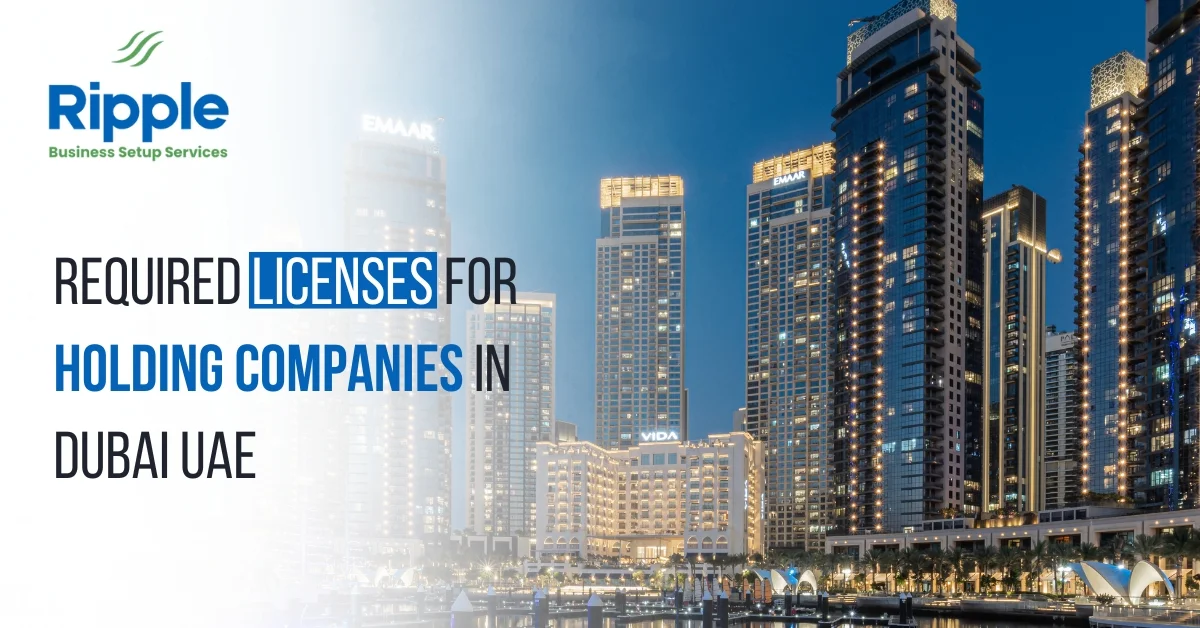Dubai has become one of the most strategic business destinations for global investors. The city’s stable economy, investor-friendly laws, and advanced infrastructure make it ideal for setting up holding companies.
A holding company in Dubai allows investors to manage and control assets, subsidiaries, and other corporate interests under one legal entity. However, before a holding company can operate, it must obtain the right licenses.
Licensing is not just a formality; it’s a legal requirement that ensures the company complies with the UAE’s corporate regulations. In this blog, we’ll break down the licenses for holding companies in Dubai, the setup process, and what investors must know to stay compliant and successful.
What Is a Holding Company in Dubai?
A holding company is a business entity formed to own shares or assets in other companies rather than producing goods or services directly. It manages investments, oversees subsidiaries, and controls intellectual property or real estate portfolios.
The main purpose of a holding company is to centralize ownership and reduce operational risks. Instead of handling daily operations, it supervises and controls other entities under its structure.
Difference between a holding and operating company:
- A holding company owns and manages assets or shares.
- An operating company handles day-to-day business activities.
In Dubai, holding companies are popular among investors in real estate, logistics, finance, and technology sectors, thanks to flexible ownership laws and the UAE’s tax-efficient structure.
Why Licenses Are Important for Holding Companies
Obtaining the right licenses is essential for legal and financial reasons. Without them, the company cannot open a corporate bank account, sign contracts, or operate under UAE law.
Here’s why licensing matters:
- Legal compliance: It ensures your business meets Dubai’s commercial regulations.
- Ownership rights: Allows the company to legally hold shares, properties, or other investments.
- Transparency: Helps maintain credibility with government bodies, investors, and partners.
- Protection: Prevents penalties, fines, or business suspension.
In short, the right licenses for holding companies in Dubai ensure smooth operations and build long-term investor confidence.
Types of Holding Companies in Dubai
Before applying for licenses, you must decide which type of holding company structure suits your business goals.
1. Mainland Holding Company
Mainland holding companies are registered under the Dubai Department of Economy and Tourism (DET). They can invest in local and international businesses without restrictions.
Key benefits:
- Access to UAE’s local market
- Flexibility in operations
- Option to work with government contracts
2. Free Zone Holding Company
Free zones are ideal for international investors seeking tax advantages and 100% ownership. Popular free zones for holding companies include DMCC, DIFC, IFZA, Meydan, and RAKEZ.
Benefits:
- 0% corporate tax (in most zones)
- 100% foreign ownership
- Full repatriation of profits
3. Offshore Holding Company
Offshore jurisdictions like JAFZA Offshore and RAK ICC are best for global asset management and confidentiality.
Advantages:
- Tax optimization
- No need for a physical office in the UAE
- Simplified reporting obligations
Main Licenses for Holding Companies in Dubai
Each type of holding company requires specific licenses to operate legally. Below are the main categories:
1. Trade License
A Trade License is mandatory for all business operations in Dubai. It is issued by the DED (for mainland) or a free zone authority.
It authorizes the company to own shares, assets, or property in other companies.
2. Financial Activity License
If a holding company manages or controls financial assets, it must obtain a Financial Activity License.
This license is crucial for entities involved in financial services, fund management, or investment holding.
3. Professional or Service License
Holding companies offering consultancy or management services to subsidiaries must hold a professional license.
This ensures compliance with UAE laws governing business advisory and management activities.
4. Investment License
An Investment License allows the company to hold stakes in other businesses and manage portfolios.
Free zones like DMCC, DIFC, and ADGM specialize in granting such licenses for investment-focused entities.
License Requirements by Jurisdiction
The licensing process and requirements vary depending on whether you set up your holding company in the mainland, free zone, or an offshore jurisdiction.
1. Holding Company License in Mainland Dubai
To establish a mainland holding company:
- Apply through the Dubai Department of Economy and Tourism (DET).
- Submit essential documents such as the MOA, shareholder details, and lease agreement.
- The capital requirement depends on the company’s structure and activities.
Mainland Benefits:
- Ability to invest locally and internationally
- Wider business scope
- Access to local clients and government tenders
2. Holding Company License in Free Zones
Free zones like DMCC, DIFC, IFZA, Meydan, and RAKEZ are ideal for investors looking for flexibility and tax advantages.
Process includes:
- Choosing the right free zone based on your activity
- Submitting license application and business plan
- Verifying shareholder details
- Getting approval and receiving the license
Advantages:
- Fast approval process
- Simplified reporting requirements
- 100% ownership and repatriation of capital
3. Holding Company License in Offshore Jurisdictions
Offshore zones like JAFZA and RAK ICC offer privacy and asset protection.
Key benefits:
- No corporate tax
- Flexible ownership laws
- Global investment options
Step-by-Step Process to Obtain a Holding Company License
Setting up a holding company in Dubai follows a clear and structured process:
- Choose business structure and jurisdiction: Decide between mainland, free zone, or offshore based on business goals.
- Reserve the company name: Register a unique name with the relevant authority.
- Prepare the Memorandum of Association (MOA): Define company ownership, activities, and capital structure.
- Submit the license application: Include documents like shareholder IDs, lease contracts, and NOCs if applicable.
- Obtain initial approval: Once authorities approve, you can proceed with bank account opening and visa processing.
- Finalize the setup: Pay the required fees and collect your license to start operations.
The process is generally smooth if you work with a professional consultancy familiar with UAE regulations.
Documents Required for Holding Company Licensing
To obtain licenses for holding companies in Dubai, you need to submit:
- Passport copies of shareholders and directors
- Proof of address and visa copies
- Business plan outlining the nature of investments
- Memorandum of Association (MOA)
- Office lease agreement or virtual office proof
- An initial approval certificate from the authority
Having all documents ready ensures faster approval and avoids delays.
Regulatory Authorities Issuing Holding Company Licenses
Different authorities in the UAE issue licenses depending on jurisdiction:
- Dubai Department of Economy and Tourism (DET) Mainland companies
- Dubai Multi Commodities Centre (DMCC) Free Zone holding companies
- Dubai International Financial Centre (DIFC) Financial and investment holdings
- Ras Al Khaimah International Corporate Centre (RAK ICC) Offshore companies
- Abu Dhabi Global Market (ADGM) Financial and asset management firms
Each authority has its own documentation and capital requirements, but all follow transparent, investor-friendly rules.
Key Compliance Obligations After Licensing
Once your holding company is licensed, you must maintain compliance to avoid penalties.
Key requirements include:
- Annual Financial Audit: Submit yearly reports to the respective authority.
- Economic Substance Regulations (ESR): Demonstrate that your company carries out core activities in the UAE.
- Ultimate Beneficial Ownership (UBO) Filing: Disclose the identity of ultimate shareholders.
- License Renewal: Renew trade licenses annually to keep operations valid.
Failing to comply with these can result in fines or license suspension.
Costs and Timeframe for Obtaining a Holding Company License
The total cost of obtaining licenses for holding companies in Dubai depends on factors such as business activity, jurisdiction, and the number of shareholders.
Estimated Cost:
The average cost to set up a holding company in Dubai ranges between AED 15,000 and AED 50,000, including registration, documentation, and government fees.
Timeframe:
- Mainland or Free Zone Setup: Usually takes around 2 to 3 weeks to complete.
- Offshore Setup: Typically completed within 3 to 5 working days.
These timelines may vary depending on approvals, documentation readiness, and the chosen authority.
Benefits of Getting a Proper Holding Company License in Dubai
Holding companies in Dubai enjoy several strategic and financial benefits, especially with the right licenses in place:
- 100% foreign ownership in free zones
- No corporate or income tax in most jurisdictions
- Full repatriation of profits and capital
- Asset protection and legal security
- Global credibility and access to financial markets
These benefits make Dubai one of the best global hubs for investors and multinational corporations.
How Ripple Can Help with Holding Company Licensing in Dubai
Setting up a holding company in Dubai involves multiple steps, from choosing the right jurisdiction to handling compliance. Ripple simplifies the entire process.
Ripple’s services include:
- Expert consultation on business setup and structure
- Assistance in preparing all licensing documents
- End-to-end coordination with authorities like DMCC, DIFC, and DET
- Post-setup compliance and renewal support
Whether you’re a new investor or expanding an existing business, Ripple ensures your holding company meets all UAE licensing and legal standards efficiently.
📞 +971 50 593 8101 | 🌐 www.ripplellc.ae
Conclusion
Holding companies are powerful tools for managing investments and expanding business operations in the UAE. However, obtaining the right licenses for holding companies in Dubai is essential for compliance, credibility, and long-term growth.
By choosing the correct jurisdiction, following the legal process, and maintaining compliance, investors can fully enjoy Dubai’s pro-business environment.
Disclaimer: This content is for informational purposes only and does not constitute legal or financial advice. Always consult with licensed business setup professionals before making investment or registration decisions in the UAE.






